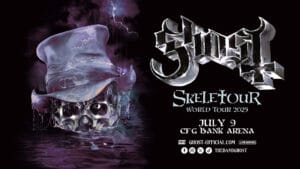The Dead Daisies – Self Titled (2013) Album Review
I’ve been pondering for a while how to present this band. Should it be the classic story of when and how the band was formed, or perhaps an album review? In the end, I decided on a mix of everything, since this blog is something I write out of love for music, and I’m my own editor and boss. This gives me the freedom to experiment with the form of my texts.
The Dead Daisies are one of those bands that, at first glance, feel familiar yet sound entirely new and fresh. They are one of those bands whose members have immense musical experience but have only been playing together for a year or two. They are a “supergroup,” as they are often called. A band that is “new” on the music scene as a collective, but whose individual members have ruled it for many years.
The story of The Dead Daisies begins in the not-so-distant year of 2012, on the faraway continent of Australia. The band was founded by Australian guitarist David Lowy, known from the band Mink, and New Zealand vocalist John Stevens, formerly of INXS. The rest of the band consisted of rotating musicians, including some big names in the rock and roll world. Today’s lineup, alongside the aforementioned duo, includes guitarist Richard Fortus (Guns N’ Roses), keyboardist Dizzy Reed (Guns N’ Roses), bassist Marco Mendoza (Blue Murder, Whitesnake), and drummer Brian Tichy (Billy Idol, Whitesnake).
This New Zealand-Australian-American (and who knows what else) band first appeared in early 2013 as the opening act on a tour with the legendary ZZ Top, and shortly after that, with Aerosmith. This tradition continued with their later performances, signaling that this is a serious band rapidly winning over numerous fans. They crowned this successful start with their first album, self-titled The Dead Daisies.
The album, recorded over just a few weeks during breaks in their tours in 2013, features twelve tracks. Founding duo John Stevens and David Lowy opted for a decidedly “old school” approach on this album. The overall impression after hearing the first few tones is that the music harkens back to the late 70s and early 80s. This might not appeal to everyone, especially those expecting a more modern take on rock music, as many older and newer bands adopt today. Instead, this album takes us back to a bygone era, evoking the best moments of the blues-rock subgenre.
The opening track, “It’s Gonna Take Time,” sets the tone with an engaging, swinging riff and a memorable chorus. Next comes “Lock ‘N’ Load,” arguably the album’s standout track. Its opening solo will likely sound familiar on the first listen—it was crafted by Slash, who co-wrote the song. His presence is felt throughout, adding a new dimension to the track, making it the best piece on the album. Following this is “Washington,” a slightly more “poppy” track in the style of The Rolling Stones, prominently featuring Dizzy Reed’s keyboard work. These three tracks were also released as singles.
The album continues with a classic bluesy track, “Yeah, Yeah, Yeah,” with a highly memorable chorus, followed by a calming semi-acoustic piece, “Yesterday.” One notable feature of the album is John Stevens’ vocals, showcasing remarkable range and versatility, shifting from smooth and clear to a raspy, smoky blues scream from one song to the next. On “Writing On The Wall,” the band shows they can experiment, while “Miles In Front Of Me” and the gritty rocker “Bible Row” deliver lively energy.
Toward the end of the album, we find another experimental track, “Man Overboard,” followed by the strong acoustic “Tomorrow” with a pleasant chorus. The final two tracks continue the blues-rock style that defines the album. “Can’t Fight This Feeling” is a bluesy number, while the galloping “Talk To Me” closes this intriguing release.
The overall impression of the album after the first listen is that it’s a small journey into the past, one that perhaps doesn’t meet high expectations. For older listeners who enjoy classic rock, it might be just right, but for newer generations of fans, it could come across as somewhat dull. My impression is that the album could have been more polished. The founding duo, Stevens and Lowy, stick to a classic rock course, but given the caliber of the musicians in the band, I feel they weren’t given enough space to showcase their talents fully. The Dead Daisies simply didn’t “fire on all cylinders,” and that works against them. On the other hand, there’s also a hint of experimentation, which gives hope for future releases.
Sign Up For Regular Updates From Junkyard World






